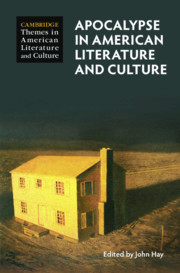Book contents
- Apocalypse in American Literature and Culture
- Cambridge Themes in American Literature and Culture
- Apocalypse in American Literature and Culture
- Copyright page
- Contents
- Figures
- Contributors
- Introduction The United States of Apocalypse
- Part I America as Apocalypse
- Chapter 1 The Apocalypse of Settler Colonialism and the Case for the Americocene
- Chapter 2 Apocalyptic Violence in Visual Media
- Chapter 3 Revelation, Secret Knowledge, and 9/11 Conspiracy Theory
- Chapter 4 Decolonial Eschatologies of Native American Literatures
- Part II American Apocalypse in (and out of) History
- Part III Varieties of Apocalyptic Experience
- Further Reading
- Index
Chapter 4 - Decolonial Eschatologies of Native American Literatures
from Part I - America as Apocalypse
Published online by Cambridge University Press: 03 December 2020
- Apocalypse in American Literature and Culture
- Cambridge Themes in American Literature and Culture
- Apocalypse in American Literature and Culture
- Copyright page
- Contents
- Figures
- Contributors
- Introduction The United States of Apocalypse
- Part I America as Apocalypse
- Chapter 1 The Apocalypse of Settler Colonialism and the Case for the Americocene
- Chapter 2 Apocalyptic Violence in Visual Media
- Chapter 3 Revelation, Secret Knowledge, and 9/11 Conspiracy Theory
- Chapter 4 Decolonial Eschatologies of Native American Literatures
- Part II American Apocalypse in (and out of) History
- Part III Varieties of Apocalyptic Experience
- Further Reading
- Index
Summary
The colonization of the Americas has long been described as an apocalyptic event that devastated indigenous peoples and lifeways. Yet since the time of Tenskwatawa and Wovoka, Native Americans have imagined a different kind of world-ending event, a counterapocalypse that would wipe out Euro-American society while simultaneously restoring tribal cultures to precolonial wholeness. This essay gives an overview of representations of such an anticolonial apocalypse from the mid-twentieth century to the present, showing how various forms of apocalypse are formulated, oftentimes in response to US Indian policy. Beginning with the pan-Indian utopianism of Martin Cruz Smith’s The Indians Won (1970), the essay goes on to show how Rebecca Roanhorse’s The Trail of Lightning (2018) draws on the emerging salience of specific tribal nationhood to imagine a possible decolonial future in the face of climatic crisis. The essay ends with a meditation on Stephen Graham Jones’s The Bird Is Gone (2006), which offers an ambivalent critique of decolonization itself as potentially apocalyptic for Native peoples.
Keywords
- Type
- Chapter
- Information
- Apocalypse in American Literature and Culture , pp. 55 - 68Publisher: Cambridge University PressPrint publication year: 2020



